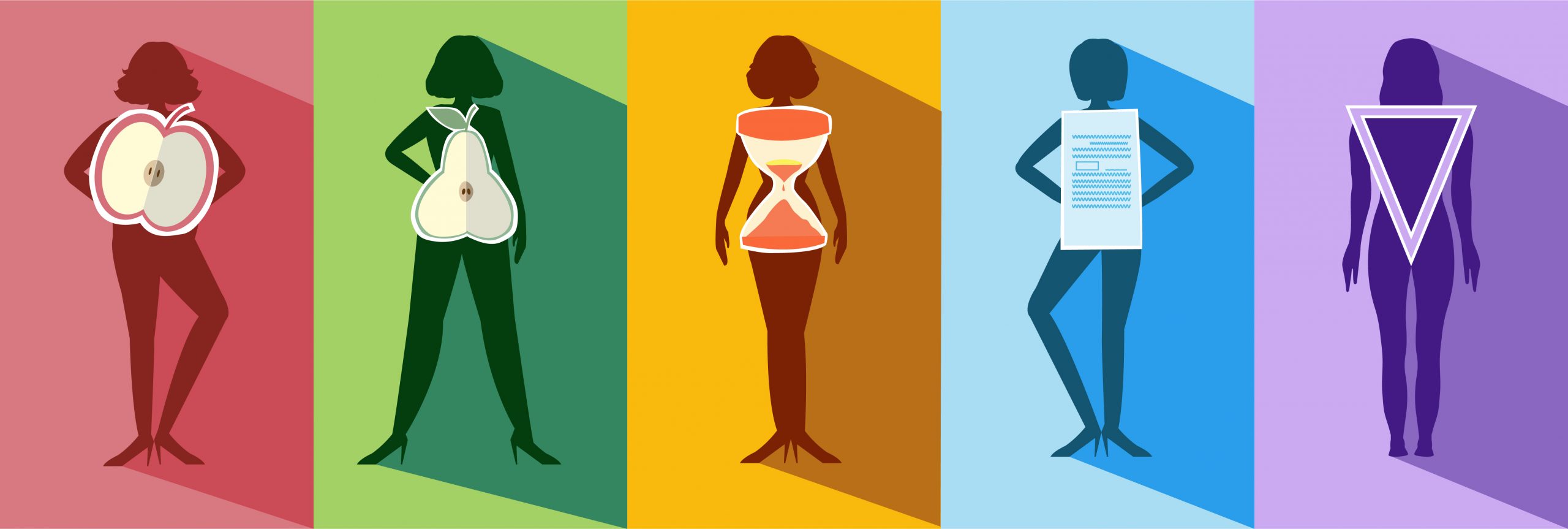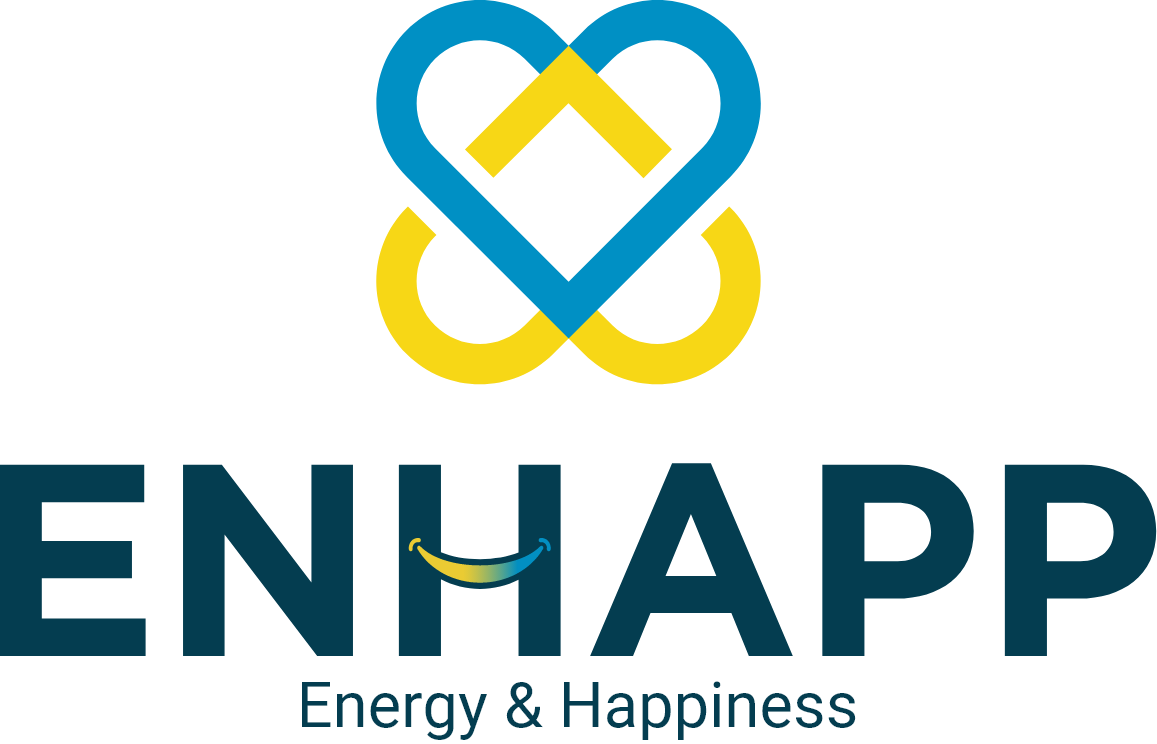We humans have 3 types of body structures – Ectomorph, Endomorph & Mesomorph.
- Ectomorph: A lean & long body structure.
- Endomorph: A more rounded body structure with slower metabolism & high fat percentage.
- Mesomorph: An athletic body structure with an efficient metabolism and can lose & gain weight easily.
Another segregation is the Body shape, which fall under these basic 5 categories:
- Apple shape: Rounded middle body,
- Pear shape: Upper body lean & lower body heavier comparatively.
- Hourglass shape: Upper & lower body broader & waistline slimmer.
- Inverted Triangle: Upper body heavy & lower body lean.
- Rectangular shape: Not much curve visible around the waistline, more or less same dimension for both upper & lower body.
The basic understanding, we must have is that there is no particular “Thyroid Body Type”.
Generally, you can be any body type & still have thyroid depending on the functioning of your thyroid gland. Whether you have hyperthyroid or hypothyroid, it doesn’t matter. In general you will find that people having thyroid will gain weight around their trunk & waistline.
The Thyroid body type are ‘morning people’, that is – they might jump out of bed, full of energy with sound sleep at night and their bodies are ready to retire by 10.30-11pm.
The cravings the “Thyroid body type” have are any stimulant that excites the body like- coffee, tea, sugar, simple carbs- bread toast, pasta, etc,.
The challenge is when they are unbalanced. If they kick-start their day with tea/coffee, the blood sugar spikes up & then crashes. Followed by sweetened cereals, again the blood sugar spikes up & crashes. And this pattern continues leaving the body hungry all day long due to the unbalanced intake. And all of these leads to your moods through a roller-coaster ride.
Especially around mid/late afternoon you will find that the lethargy & yawning is non-stop for people with thyroid when they don’t maintain a balanced meal.
A simple change in the Diet will help sort-out most of these issues.
Diet for Thyroid:
Thyroid hormones help control growth, cell repair, and metabolism. As a result, people with hypothyroidism may experience tiredness, hair loss, weight gain, feeling cold, and feeling down, among many other symptoms. Food alone won’t cure hypothyroidism. However, a combination of the right nutrients and medication can help restore thyroid function and minimize your symptoms.
Foods to Eat for Thyroid:
Simple change like adding protein in each meal will automatically make you feel more balanced and keep your mood in control along with controlled hunger pangs.
- Eggs: Whole eggs are best, as much of their iodine and selenium are found in the yolk, while the whites are full of protein.
- Meat: All meats, including lamb, beef, chicken, etc.
- Fish: All seafood, including salmon, tuna, halibut, shrimp, etc.
- Vegetables: All vegetables especially cruciferous vegetables are good to eat in moderate amounts, especially when cooked.
- Fruits: All fruits, including berries, bananas, oranges, tomatoes, etc.
- Gluten-free grains and seeds: Rice, buckwheat, quinoa, chia seeds, and flax seeds.
- Dairy: All dairy products, including milk, cheese, yogurt, etc.
- Beverages: Water and other non-caffeinated beverages.
To quickly summarize, the three most important Nutrients needed are:
- Iodine: Iodine is an essential mineral that is needed to make thyroid hormones. Thus, people with iodine deficiency might be at risk of hypothyroidism. If you have an iodine deficiency, consider adding iodized table salt to your meals or eating more iodine-rich foods like seaweed, fish, dairy, and eggs.
- Selenium: Selenium helps “activate” thyroid hormones so they can be used by the body. This essential mineral also has antioxidant benefits, which means it may protect the thyroid gland from damage by molecules called free radicals. Adding selenium-rich foods to your diet is a great way to boost your selenium levels. This includes Brazil nuts, tuna, sardines, eggs, and legumes.
- Zinc: Like selenium, zinc helps the body “activate” thyroid hormones. Zinc may help the body regulate TSH, the hormone that tells the thyroid gland to release thyroid hormones. Aim to eat more zinc-rich foods like oysters and other shellfish, beef, and chicken.
People with hypothyroidism should aim to eat a plant-based diet and lean meats. These are low in calories and are very filling, which may help prevent weight gain.
Foods to Avoid for Thyroid:
Foods that contain goitrogens should be eaten in moderation and ideally it has to be cooked. You may want to avoid eating highly processed foods, as they usually contain a lot of calories. This can be a problem if you have hypothyroidism, as you may gain weight easily.
- Millet: All varieties.
- Highly processed foods: Hot dogs, cakes, cookies, etc.
- Supplements: Adequate intakes of selenium and iodine are essential for thyroid health, but getting too much of either may cause harm.
- Soy-based foods: Tofu, tempeh, edamame beans, soy milk, etc.
- Certain fruits: Peaches, pears, and strawberries.
- Beverages: Coffee, green tea, and alcohol — these beverages may irritate your thyroid gland, and cause sudden raise & dip in mood & blood sugar levels.
Workout for Thyroid:
Hypothyroidism, or having an underactive thyroid, can cause many symptoms like fatigue, joint pain, heart palpitations, and depression. The condition also reduces overall metabolism, making those with hypothyroidism more prone to weight gain. Exercise can relieve many of the symptoms associated with hypothyroidism and can improve cardiovascular health and muscle mass.
Get your Heart Pumping with regular cardiovascular exercises like – jogging, brisk walk, skipping. The related mood-boosting benefits can also relieve other hypothyroidism symptoms including depression and fatigue.
Protect your joints with low-impact exercises as people with hypothyroidism frequently experience muscle and joint pain. Low-impact activities like yoga, pilates, walking, swimming, and biking are some great options.
Build muscles as hypothyroidism lowers your body’s resting metabolic rate. People with this condition are more liable to gain weight and suffer secondary problems caused by obesity. Building muscle through strength training can counteract these effects.
Recovery post workout sessions are equally important for rest & recovery especially if you are fighting with fatigue through the daytime.
Sleep & rest is the answer to manage your thyroid better. Not to forget your thyroid medications on an empty stomach and no food consumption for an hour post medication so that the medicines can help your body function normally.
So, let’s follow these simple steps to attain a balanced thyroid. ?
Written by Ananya Bhattacharya, ENHAPP Wellness Coach & Nutritionist




